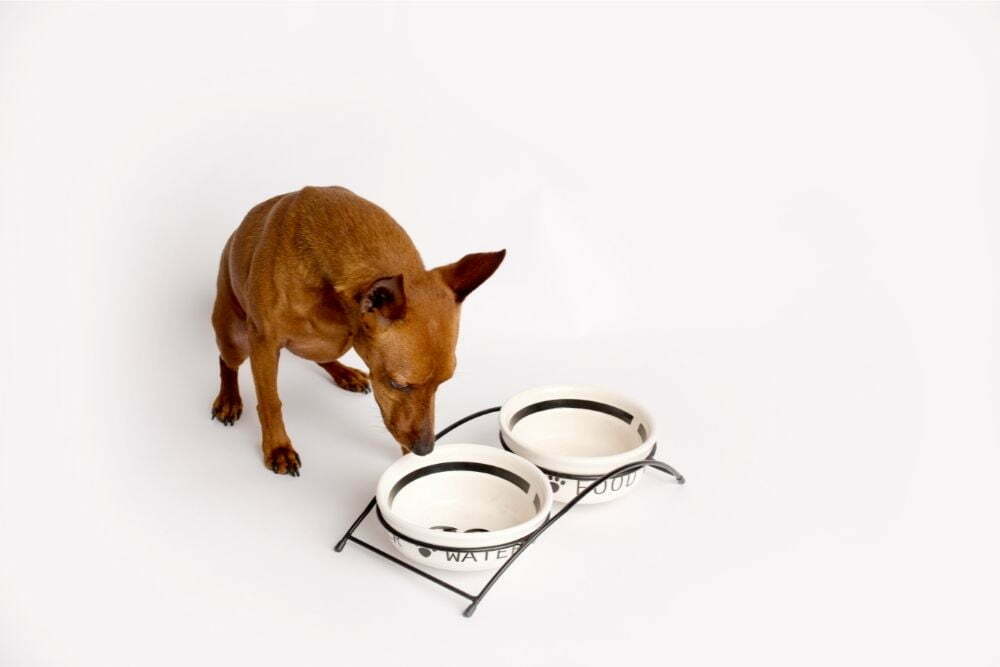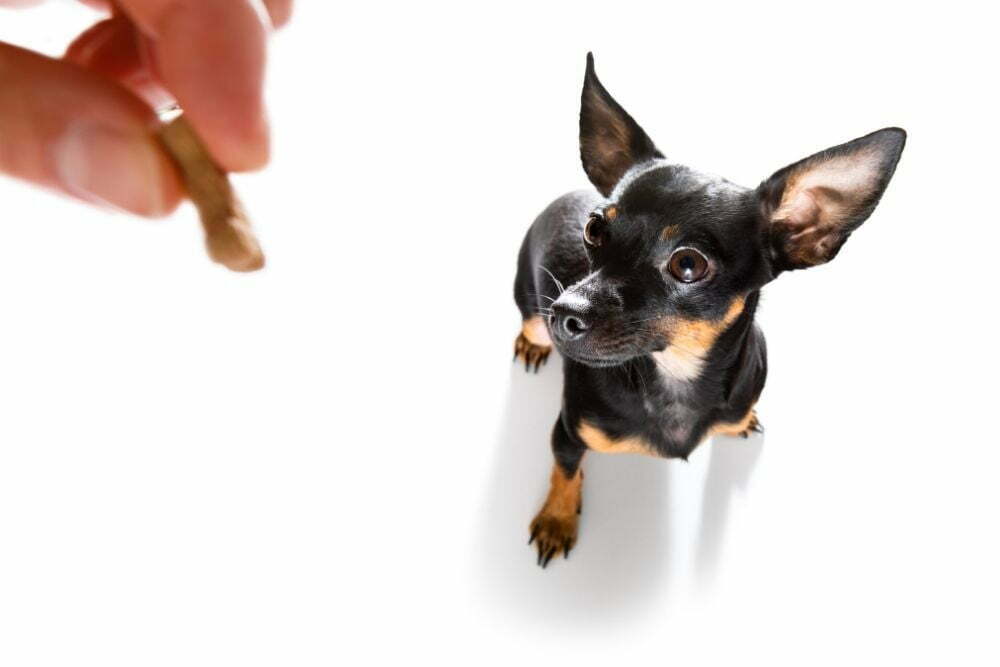Miniature Pinschers will tend to weigh between 8 and 11 pounds. They are small dogs with huge personalities and buckets of energy. The best way to feed them is to give them 2 smaller meals per day.

Experts tend to recommend around ½ ounce of dog food for each pound of body weight. It is very dangerous to their health if you under or over-feed your dog. Great care should be taken to ensure their diet is keeping them healthy. If you are uncertain about this, please contact a veterinarian for further help and advice.
How much should I feed my miniature pinscher puppy?
A miniature pinscher puppy will need around ¼ cup of specially formulated puppy food daily. It is a good idea to split this up into 3 or 4 small meals to ensure their small stomachs are not overwhelmed by the volume.
By the time they reach about 6 months of age, you should be able to switch your puppy over to adult food and give them larger portions less frequently.
Can miniature pinschers eat human food?
Yes, miniature pinschers can eat human food, but it is not advised. While it may seem kind to sneak them a treat, doing this too often can lead to harmful consequences for their health.
Miniature pinschers have quite small mouths. This means that if you choose to feed them human food, it must be cut to an appropriate size. If the pieces are too big then your dog may choke or simply be unable to chew the food. Generally speaking, treats should be smaller than ½ inch in diameter.
If you are going to be feeding your dog human food, choose clean protein sources such as chicken and salmon. Chips, sweets, and other human snacks may smell tempting to your dog, but they will likely give them an upset stomach.
Many foods are very toxic to dogs, and they should never be allowed to consume these. The ones that everyone knows about are grapes and chocolate, but there are many other human foods that can make your furry friend ill.
These include almonds, cinnamon, garlic, onions, dairy products, and macadamia nuts. Any foods containing caffeine should be avoided, as should avocado and chives. Human food can also be high in fat, salt, and sugar which can damage their health over time.
Some people swear that their dog loves cheese and other dairy products. This may be the case, but dogs are genetically predisposed to lactose intolerance. This means that ingesting foods that contain a lot of dairy could potentially cause gastrointestinal issues.

How many calories should a miniature pinscher eat?
A general rule of thumb when feeding miniature pinschers is to feed them 44 calories per pound of body weight. It is a good idea to weigh your dog regularly to ensure you are feeding them a sufficient amount of calories to maintain a healthy weight.
You should look at the calorie content of your dog’s food and work out the appropriate amount of food to give them. It is a good idea to split this amount into 2 and feed your dog once in the morning and once in the evening.
You should pay attention to your dog’s physique to ensure they are retaining a healthy weight. You should be able to feel their ribs with ease, but you should not be able to see them. If you cannot feel the ribs, this is an indication that you are overfeeding your dog. Conversely, if you can see the ribs, your dog is likely malnourished.
What is the best food for a miniature pinscher?
The best diet for a miniature pinscher is a raw food diet. Dogs have evolved from wolves over time, but their digestive tracts have not changed much through this process. This means that their systems are best equipped to digest protein-rich, fresh food sources.
The main ingredient in most commercial dog food (such as kibble) is carbohydrates. This could be in the form of grains, peas, legumes, or lentils. Their stomachs are not able to digest and ferment these carbohydrates properly. This can cause problems in the long run as it puts their body under undue pressure and strain.
Raw food has been proven to enhance the gut microbiome in miniature pinschers. This is the delicate ecosystem of bacteria that is found in the stomach and helps to keep your dog in good health. Eating highly processed dog kibble can lead to the development of a leaky gut. This is where the intestinal lining becomes perforated, allowing food particles and toxins to escape into the bloodstream. This can trigger immune responses and can significantly heighten the risk of illness.
Younger dogs will have a much higher protein requirement than older or more sedentary dogs. Bone meals and high-quality raw meat are great ways to incorporate protein into your dog’s diet. Baked calves livers are another snack that your pup will love. These are very high in iron and will do wonders for their health.
If you are making your own food for your dog, you will need to research to ensure you are hitting all of their key nutritional requirements. As a general rule, their diet should consist of 50% protein from meat, fish, or poultry.
These should be lean sources of protein, such as skinless chicken, skinless turkey, and salmon. 30% of the diet should be complex carbohydrates such as barley, quinoa, brown rice, and sweet potato. The other 20% should consist of fruits and vegetables. Good suggestions include carrots, green beans, apples, pears, bananas, and pumpkins.
It is a good idea to supplement your dog’s diet to complement the nutrients that they are getting from their food. There are many available at all pet stores, and they are easy to get ahold of. It is a good idea to incorporate a vitamin and mineral supplement into your dog’s diet. Some of them contain probiotics and digestive enzymes to enhance your dog’s digestive system.
